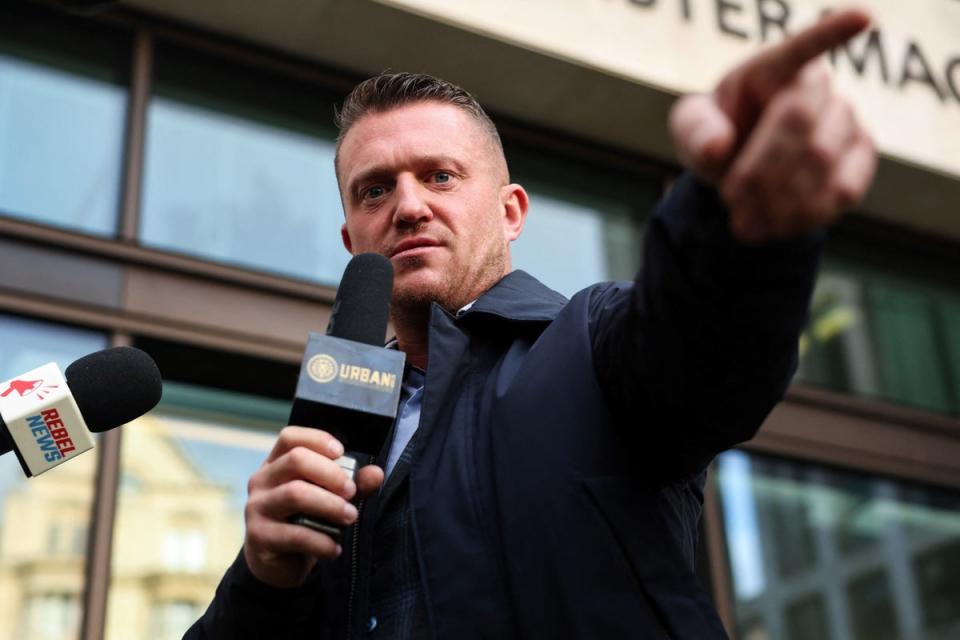Tommy Robinson cleared of refusing to leave antisemitism march after Met Police paperwork error
- Oops!Something went wrong.Please try again later.
Tommy Robinson has been cleared of refusing to leave Westminster after he was arrested during an antisemitism march last November.
It comes after a senior Metropolitan Police officer who signed the dispersal order admitted it may not have been lawful after he used the wrong date on the paperwork.
Robinson, whose real name is Stephen Yaxley Lennon, had denied failing to comply with a direction when he was arrested by police officers opposite the Royal Courts of Justice.
Giving his ruling, District Judge Daniel Sternberg said: “I am not satisfied there was a legal authorisation.
“There is no case for you to answer.”

The Met Police have since that they will review the procedural errors and the judge’s findings, to ensure any changes can be implemented.
The English Defence League founder had attended central London to participate in the demonstration, which came in the wake of the Israel-Hamas war, despite being warned by organisers he would not be welcome.
Inspector Steve Parker-Phipps, responsible for policing certain aspects of the protest, imposed a Section 35 order under the Crime and Policing Act 2014 when he thought a “right-wing group” could potentially be attending, the trial at Westminster Magistrates’ Court heard.
The court heard Inspector Parker-Phipps, whose laptop battery was “dying”, put the order in place at 10am on November 26, but accidentally dated the form for November 24.
Mr Robinson’s defence lawyer Alisdair Williamson KC told the court there had been a “litany of catastrophic errors” in the Met’s handling of the incident.
Questioning the inspector, Mr Williamson KC said: “This document is not correct is it?
“Can we have any confidence that there was a lawful order in place?” After a pause, the officer replied: “No.”
Robinson was arrested in a cafe on the Strand a short while later, with the court told he became “resistant” and was arrested.
He was subsequently sprayed with synthetic pepper spray and handcuffed, with Robinson later uploading a video of himslef with partially closed eyes to social media.
During his arrest, he also repeatedly claimed to officers that he was a present as a journalist at the march.
The trial was attended by numerous supporters of Mr Robinson who filled the public gallery.
In response to the verdict, a Met Police spokesperson said: “Stephen Lennon had been charged with failing to comply with an order to disperse from the vicinity of the March Against Antisemitism as it formed up on the Strand on Saturday, 26 November.
“The court has found Mr Lennon has no case to answer, owing to a number of procedural errors by the police. We will review the finding to ensure any changes to our approach can be implemented without delay.
“The decision to impose a dispersal order on that day was taken to provide officers with the powers to keep groups or individuals with opposing views apart, ensuring public safety and minimising the risk of disorder.”
They added that dispersal orders are commonly used in public order policing, which has become increasingly challenging in recent months.
“We will continue to take the actions necessary to keep the peace, balancing individual rights – including the right to protest – with the need to keep the public safe and prevent serious disruption and disorder,” they said.

